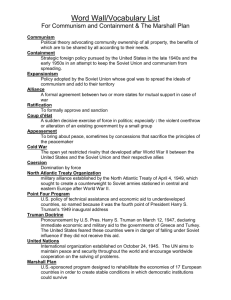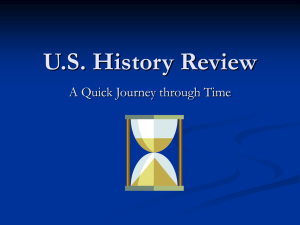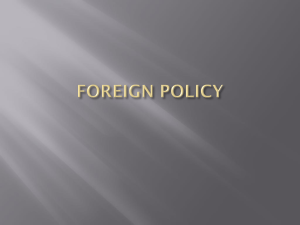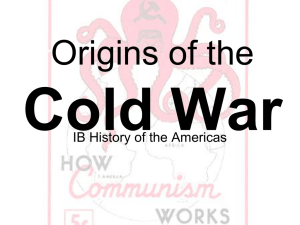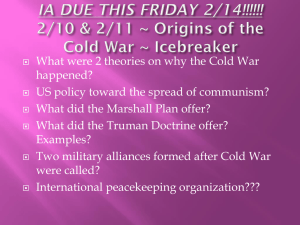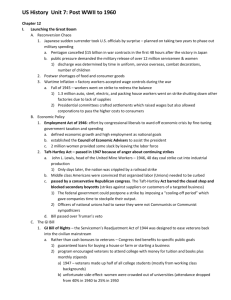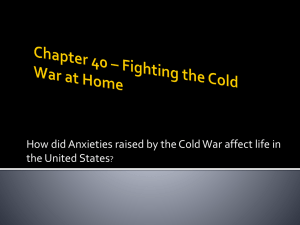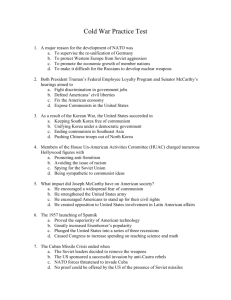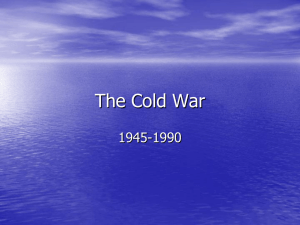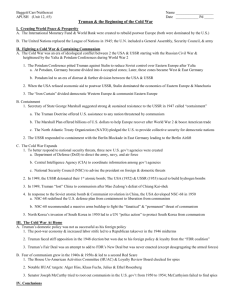Historian List
advertisement
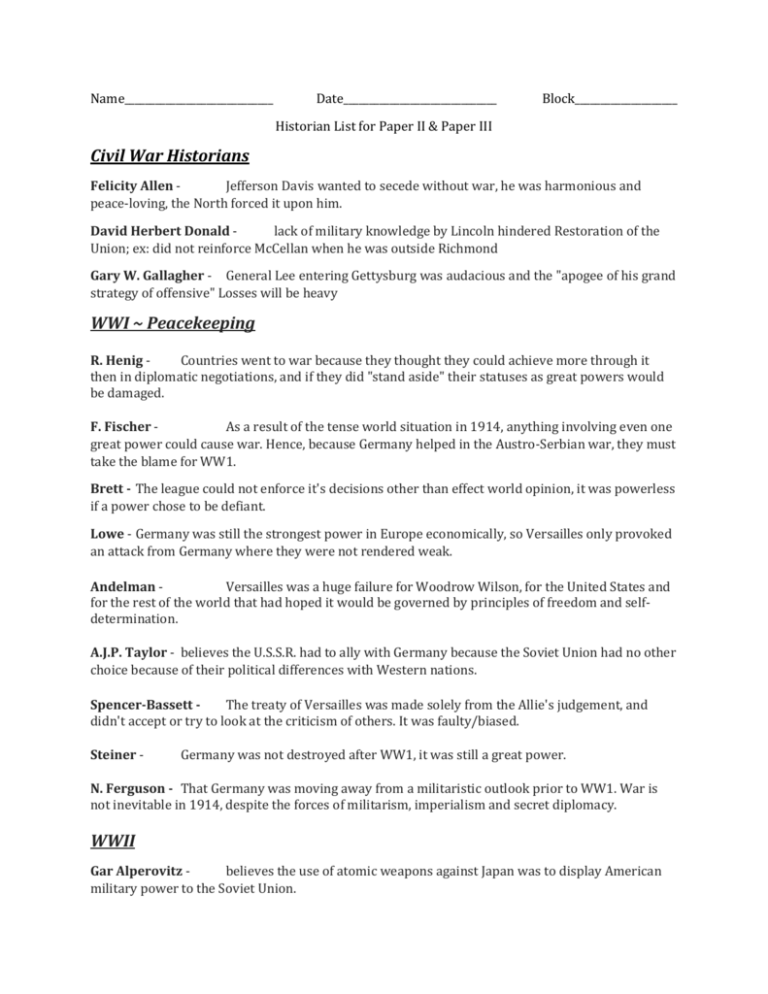
Name_____________________________
Date______________________________
Block____________________
Historian List for Paper II & Paper III
Civil War Historians
Felicity Allen Jefferson Davis wanted to secede without war, he was harmonious and
peace-loving, the North forced it upon him.
David Herbert Donald lack of military knowledge by Lincoln hindered Restoration of the
Union; ex: did not reinforce McCellan when he was outside Richmond
Gary W. Gallagher - General Lee entering Gettysburg was audacious and the "apogee of his grand
strategy of offensive" Losses will be heavy
WWI ~ Peacekeeping
R. Henig Countries went to war because they thought they could achieve more through it
then in diplomatic negotiations, and if they did "stand aside" their statuses as great powers would
be damaged.
F. Fischer As a result of the tense world situation in 1914, anything involving even one
great power could cause war. Hence, because Germany helped in the Austro-Serbian war, they must
take the blame for WW1.
Brett - The league could not enforce it's decisions other than effect world opinion, it was powerless
if a power chose to be defiant.
Lowe - Germany was still the strongest power in Europe economically, so Versailles only provoked
an attack from Germany where they were not rendered weak.
Andelman Versailles was a huge failure for Woodrow Wilson, for the United States and
for the rest of the world that had hoped it would be governed by principles of freedom and selfdetermination.
A.J.P. Taylor - believes the U.S.S.R. had to ally with Germany because the Soviet Union had no other
choice because of their political differences with Western nations.
Spencer-Bassett The treaty of Versailles was made solely from the Allie's judgement, and
didn't accept or try to look at the criticism of others. It was faulty/biased.
Steiner -
Germany was not destroyed after WW1, it was still a great power.
N. Ferguson - That Germany was moving away from a militaristic outlook prior to WW1. War is
not inevitable in 1914, despite the forces of militarism, imperialism and secret diplomacy.
WWII
Gar Alperovitz believes the use of atomic weapons against Japan was to display American
military power to the Soviet Union.
Michael Burleigh believed Hitler declared war because of Hitler's racial views of
America ('half-Judaised and half-negrified').
Sir Basil Liddell Hart believes the allies demand for unconditional surrender was pivotal
in encouraging last-ditch German resistance.
Daniels The Yalta treaty was what changed wartime collaboration into post-war
confrontation.
Cold War
M. McCauley (Revisionist) - Thought that Stalin strengthened Soviet Russia through his
campaigns of industrialization, collectivization and social transformation
D. Painter The Berlin wall was an ideological defeat of colossal proportions for the
Soviet Union and world communism.
B. Lightbody- The Berlin wall ruined peaceful co-existence.
ThorpeEmpires were gone but instead countries built spheres of influence, which were
basically the same thing.
Gaddis The Cold War was caused by both complicated external and internal developments
inside both the USA and USSR.
Kissinger Cold War.
It was Ronald Reagan's presidency that marked the turning point in the end of the
T. Patterson - Cold war was caused by Americans; "Dollar diplomacy", US foreign policy linked to
the needs of Capitalism. They wanted to penetrate Eastern Europe, and their aggressive foreign
policy was down to fear of recession.
V. Mastny Stalin's role was pivotal. Soviet foreign policy at this time can be explained in terms
of "stalinism" and Stalin's paranoia and suspicion.
W. LaFeber - US and USSR are both aggressive expansionist powers, so hostility that developed
into the cold war was a continuation of the policies they had pursued in the 19th century.
Vojtech Mastny cause of the conflict.
saw the Soviet Union's attempt to gain more influence in Europe as the main
Derrick Murphy explains, 'It seems clear that some form of tension between the USA and
USSR would have sprung up following the Second World War. The two new superpowers were
competing for influence in a new international order.'
John Lewis Gaddis -believes the USA did not follow a consistent policy after 1945 because the USA
had to adjust to a rapidly changing European scene.
William Appleman - Revisionist historians believe the USA was partly to blame for the post-1945
Cold War.
Simon Ball - believes, 'there is little doubt that the Cold War came to an end as a result of Soviet
economic failure. This failure led in turn a failure of nerve amongst the Soviet governing elite.'
Simon Ball and Martin McCauley - believe by the late 1980s the USSR was no longer in a position
to maintain the military forces necessary for superpower status.
Economist Journal - in the 1980s suggested the Soviet economy was of Third World standard
Martin McCauley believes, 'The Cold War came to an end because it was impossible for two
powers to divide and rule the world. The will power had drained away.'
Stephen Ambrose -
Blames Truman for wanting to increase US involvement in Asia
James Patterson Military adivors recommended removing troops to strengthen NATO and the
North is the one that invaded South
Dean Acheson -
Domino Theory
Alonzo Hamby would agree as he believes Truman had the opportunity to blame the lack of
economic success on Congress' inability to pass Truman's economic policies
Robert Ferrell would agree as he believed Truman's failure to implement domestic
policies can be traced back to his clash with congress
Robert R. Bowie Deems Eisenhower set the strategy against Communism and he made
significant changes in foreign policy that would be beneficial for the US in the Cold War, although
Truman started containment he had no organized plan on how to approach war against
Communism
Ralph Lee Woodward Jr. Alliance for Progress was a failure since Kennedy could not
accomplish everything he promised; it failed with helping social and political structure of Latin
America even before he was assassinated thus the policy was a failure.
Lawrence Freedman Alliance for Progress was created due to Kennedy's fear of Castro
and the spread of Communism into Latin America and then into the US, however his attempts to
create an alliance with Latin America fell short and was a failure.
Walter Lafeber Bay of Pigs occurred since Kennedy did not want to appear soft on
Communism since he condemned Eisenhower to be soft on Communism; in actuality it
strengthened Castro's power
R. Beggs Cuban Missiles were risky, but if it had gone to plan, the Soviets would have gained
world recognition which would have benefited them in the Cold War.
Walter Lafeber In terms of the Vietnam War, Kennedy wanted to send more soldiers and
take a more aggressive approach and feared China would take a larger role in Vietnam and control
S. E. Asia to humiliate both USSR and US.
- Do not overdue historiography
- Spend time organizing your thoughts and pre-writing (outline)
- If you can’t remember historians it’s not the end of the world
- Really analyze the question and determine what it is asking you
- DO YOUR BEST!!!! AND YOU WILL DO FINE!!! GOOD LUCK!!!!!!!!!!!
